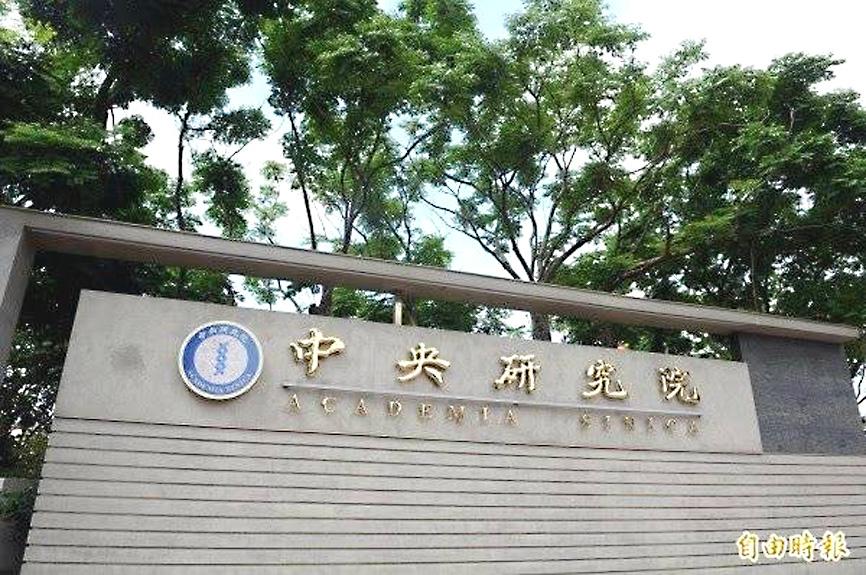At least 10 Academia Sinica members are Chinese nationals who do not possess Republic of China (ROC) citizenship, researchers at the institution said yesterday, calling for staffing rules to be amended.
“The current situation — allowing Chinese to hold research positions at Academia Sinica — does not help Taiwan become more international,” Academia Sinica academician Liaw Yun-fan (廖運範) said, adding that the rules should be amended to bar Chinese from becoming research fellows at the institution.
Academia Sinica members are peer-elected and any changes to the institution’s regulations must be decided by a meeting of all of its fellows, it said in a statement.

Photo: Chien Jung-fong, Taipei Times
However, Article 4 of the Academia Sinica Organic Law (中研院組織法) states that fellows should be chosen from among those with “outstanding achievements within the nation’s academia,” Liaw said, adding that this implies that fellows should be ROC citizens.
The Control Yuan last year asked the institution how many of its members were Chinese, but was told by an Academia Sinica representative that it “does not ask nominated members their nationality.”
Democratic Progressive Party Legislator Fan Yun (范雲) on Thursday last week asked the institution for information on fellows of Chinese nationality, but did not receive a response.
Following Fan’s inquiry, several fellows issued a joint statement calling for the institution’s organizational rules to be amended so that it clearly stipulates that ROC citizenship is a requirement to become a fellow.
“Allowing Chinese to be elected as academicians is laughable,” Liaw said. “Chinese academics have already stolen technology in the US. Do not assume that Taiwan has no research secrets.”
Academia Sinica has a system for recognizing honorary fellows, which it uses to invite researchers to the institution from all over the world, he said, adding that amending the institution’s rules would not affect international exchanges.
Echoing Liao’s sentiment, academician Lin Ming-chang (林明璋) said that the organizational rules should be amended as existing regulations make it easy for Chinese-language speakers from anywhere to gain a position at the institution, which is “unfair to Taiwanese academics who do good research.”
A rule change would not discriminate against any particular group and would not affect international exchanges, he added.
A former Academia Sinica member from China was only permitted to be a visiting foreign scholar at Beijing’s Chinese Academy of Sciences after he gave up his Chinese citizenship for US citizenship, Lin said, but added that Academia Sinica permitted him to remain a fellow, despite the change in citizenship.
The example shows that Academia Sinica does not follow normal international practice regarding academic posts, Lin added.

CAUTION: Based on intelligence from the nation’s security agencies, MOFA has cautioned Taiwanese travelers about heightened safety risks in China-friendly countries The Ministry of Foreign Affairs (MOFA) yesterday urged Taiwanese to be aware of their safety when traveling abroad, especially in countries that are friendly to China. China in June last year issued 22 guidelines that allow its courts to try in absentia and sentence to death so-called “diehard” Taiwanese independence activists, even though Chinese courts have no jurisdiction in Taiwan. Late last month, a senior Chinese official gave closed-door instructions to state security units to implement the guidelines in countries friendly to China, a government memo and a senior Taiwan security official said, based on information gathered by Taiwan’s intelligence agency. The

Taiwan Semiconductor Manufacturing Co (TSMC), the world’s largest contract chipmaker, said yesterday that it is looking to hire 8,000 people this year, at a time when the tech giant is expanding production capacity to maintain its lead over competitors. To attract talent, TSMC would launch a large-scale recruitment campaign on campuses across Taiwan, where a newly recruited engineer with a master’s degree could expect to receive an average salary of NT$2.2 million (US$60,912), which is much higher than the 2023 national average of NT$709,000 for those in the same category, according to government statistics. TSMC, which accounted for more than 60 percent

The National Immigration Agency (NIA) said yesterday that it will revoke the dependent-based residence permit of a Chinese social media influencer who reportedly “openly advocated for [China’s] unification through military force” with Taiwan. The Chinese national, identified by her surname Liu (劉), will have her residence permit revoked in accordance with Article 14 of the “Measures for the permission of family- based residence, long-term residence and settlement of people from the Mainland Area in the Taiwan Area,” the NIA said in a news release. The agency explained it received reports that Liu made “unifying Taiwan through military force” statements on her online

Tung Tzu-hsien (童子賢), a Taiwanese businessman and deputy convener of the nation’s National Climate Change Committee, said yesterday that “electrical power is national power” and nuclear energy is “very important to Taiwan.” Tung made the remarks, suggesting that his views do not align with the country’s current official policy of phasing out nuclear energy, at a forum organized by the Taiwan People’s Party titled “Challenges and Prospects of Taiwan’s AI Industry and Energy Policy.” “Taiwan is currently pursuing industries with high added- value and is developing vigorously, and this all requires electricity,” said the chairman